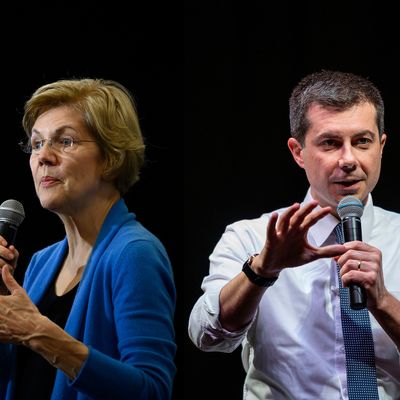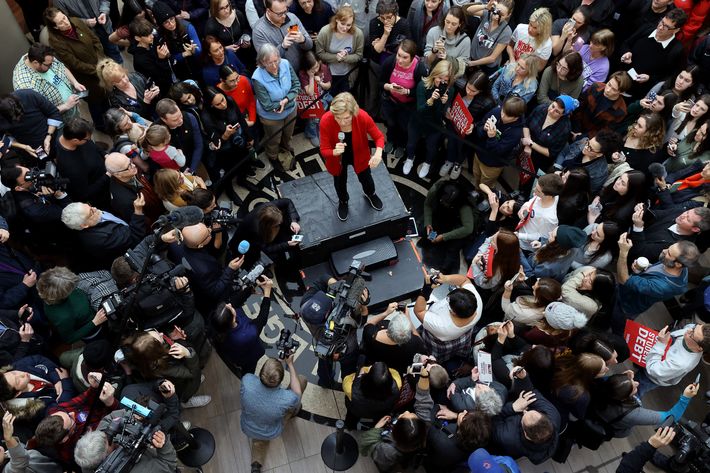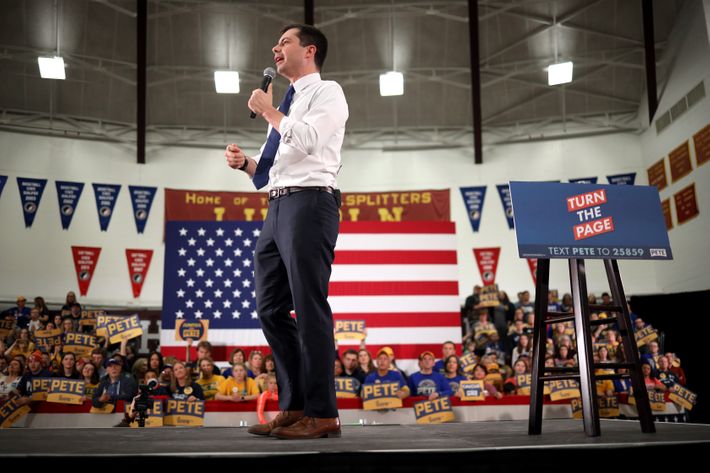
The day before the Iowa caucuses, the atmosphere of a close, tense contest was only enhanced by the failure to launch of the usually reliable Des Moines Register/CNN/Mediacom Iowa Poll (aborted at the last moment after the Buttigieg campaign raised concerns about its methodology). So it’s fitting that on this bright Sunday, I attended events for two candidates whose strategies have most depended on a good result here in Iowa.
At Simpson College in Indianola (a small town a half-hour outside Des Moines), Elizabeth Warren’s campaign exuded its usual vibe of intensity and obsession with the mechanics of caucusing. The candidate herself appeared in the overflowing auditorium about an hour late, after her local precinct captain reminded the crowd that “what we do here matters.” Adding to the sense of urgency, she let the crowd know she wouldn’t be performing her customary selfie line on this penultimate day for campaigning, but would offer her dog, Bailey, as a substitute (adding that he “is a good boy”).

It was impossible to tell from the conduct of Warren, her staff, or her volunteers whether the botched Iowa Poll represented a dodged bullet or a lost opportunity. Her strategy in Iowa all along has been to exceed expectations with the best organization in the field, and this is probably not the time to fail to “persist” with the prize so close and the outcome so unclear. But because her national strategy depends so much on Iowa, there’s bound to be some fear of the unknown in her camp as well.
When she was riding high in the national polls in late summer and early autumn, you could see a clear path to the nomination for her, running straight from Des Moines to Milwaukee, the site of July’s Democratic National Convention. It appeared that she might either squeeze Bernie Sanders off his own path to the nomination, or position herself as a clear and increasingly popular alternative to both Sanders and Biden.
But as her national and early-state standing gradually eroded, Bernie’s flourished and Biden’s held strong, making an impressive Iowa finish Warren’s slender lifeline. A loss to Sanders here would, for the moment, end any talk of her becoming the progressive survivor of the invisible primary battling the Establishment and its presumed candidates (Biden, Buttigieg, and Klobuchar). Without momentum from Iowa, Warren’s next stops in New Hampshire and Nevada don’t look very promising. And a loss to both Sanders and Biden in Iowa could set the political obituary writers to work. Just days into the voting phase of the 2020 contest, the idea of vindicating Hillary Clinton’s big loss by breaking the glass ceiling and finally electing a woman to the presidency could look premature once again.
Clinton’s loss was on my mind when I entered the Roundhouse Arena at Des Moines’ Lincoln High School (“Home of the Railsplitters”) for Pete Buttigieg’s big pre-caucus rally. It was the site of Clinton’s final Iowa caucus rally in 2016, at which her campaign looked confident but nervous, just before her narrow win over Bernie Sanders (which his campaign, of course, questioned).
Team Pete filled the Roundhouse as fully as Clinton’s well-honed operation had four years ago. He was introduced by his recently acquired sidekick, Congressman Anthony Brown of Maryland, a talisman against claims he has no African-American supporters. The vibe, beginning with the candidate’s own unvarnished prediction of victory, was that of a campaign trying to talk itself into self-confidence. And Buttigieg may have even more to win and lose in Iowa tomorrow than Warren. If she needs to finish ahead of Sanders, he needs to finish ahead of Biden. But given his current polling weakness in states voting after New Hampshire, an actual win in Iowa is what he really needs.

Both Warren and Buttigieg have been offering unity pitches down the stretch in Iowa. The Massachusetts senator has been working to revive the once-strong sense that she could be a unity figure for a Democratic Party torn between the “political revolution” of Sanders and the less substantive agenda associated with Biden’s nostalgia-focused campaign.
Buttigieg, whose sharp elbows toward fellow Democrats have been more prominent as the campaign has evolved, is claiming he’ll serve as an instrument of national unity, as the candidate who can credibly reach out to military veterans, people of faith, and others who have tuned out the Democratic Party. It’s no secret that he’s trying to buy some of the Obama ’08 vibe that electrified Iowa with a trans-partisan message. And in a way, here in the Roundhouse, Buttigieg is offering his own subtle rejoinder to Biden’s claim to represent the Obama legacy., He presented himself as the candidate prepared to “turn the page” (his main slogan) not just on Trump but on the era of politics that have turned steadily sour in the 21st century. Alluding to Obama’s 2008 win in Iowa and the hope it gave him as a gay man, he challenged the audience: “Are you ready to make history a second time?”
In the Q&A period, Buttigieg was asked about his favorite Beatles song. He answered “Come Together,” of course, as the crowd went crazy. In response to a question about electability, he said: “I have my own answer, but we can provide our own answer tomorrow.” It’s unclear whether this naked appeal to Iowa’s change-making power will work, but it makes sense for Pete.
Buttigieg and Warren represent one tradition of appealing to Iowans by offering, in their own ways, a different agenda for the Democratic Party. Sanders and Biden represent Iowa’s ability to confirm the recent past, whether it’s Bernie’s frustrated but still-vibrant “revolution” or Biden’s restoration project. Both Buttigieg and Warren are capable of exceeding expectations Monday night, and both could be in trouble if they underperform. Personally, my money’s on Warren’s organization — her, well, persistence, and her potential as a unity figure in a party that needs one. But in a cycle when Iowans have been slow to decide, and when even one of the best pollsters in America can’t tell us what will happen, anything could.






























